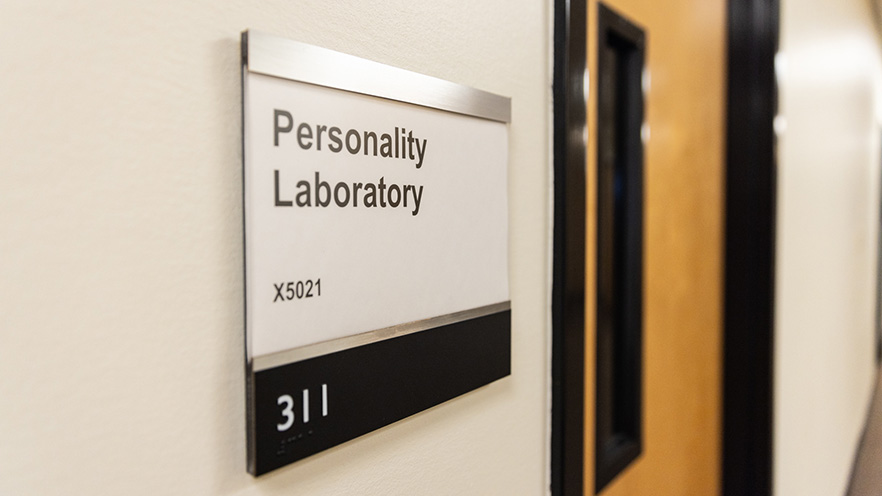What Happens in Whitman’s Personality Lab?
Hint: It’s more than just learning about what makes us who we are
By Pam Moore

Whitman’s Psychology Department established the Personality Lab in 2009 as a hub for the study of personality and to teach students how to engage in scientific research.
“As a professor, a significant part of my role is to be nurturing and supportive of my students while helping them reach their educational goals,” says Pavel Blagov, Professor of Psychology and the lab’s director.
5 Lessons Learned by Psychology Majors
Investigating topics such as personality adjustment in sexual minority individuals or links between personality and memories, the lab’s student-researchers also learn lessons that go far beyond the discipline of psychology.
Psychology majors Abby Bergey ’22 , Max Duvall ’22 and Virgil Berlin ’23 worked with Blagov and other students on research projects in the Personality Lab during their years at Whitman. Now they are all pursuing advanced psychology degrees. Here are five ways they were impacted by the intensive mentoring and training they received in the Personality Lab—and what happens there on a typical day.
1. Falling in Love with Research
When he arrived at Whitman, Duvall understood psychology “completely as a practice,” he recalls. “I thought you learned about psychological disorders through engaging with your clients in a clinical setting.”
But Duvall, who is applying to clinical psychology PhD programs, says the Personality Lab changed his mind. “It’s actually through this abundant body of research that we can fully understand different psychological conditions.”
Once he had the chance to engage in research, he fell in love with the process. “I love taking a complex problem and finding a unique way to find the solution. And I’d say that’s 70 percent what research is about.”
2. Mastering Research Methods
Berlin credits the Personality Lab with giving him the training and experience to feel comfortable conducting research. “I can do qualitative analysis now,” says Berlin, who is applying to graduate programs in clinical psychology and counseling.
Those skills have laid the groundwork for landing his current position as a researcher in a Northwestern University lab, and will undoubtedly bolster his graduate school applications.
3. Establishing Successful Collaborations
Both Duvall and Berlin recall many times when their research teams initially couldn’t agree on how to code certain pieces of data. But learning to navigate these interpersonal conflicts paid dividends.
While those situations pushed Duvall out of his comfort zone, they also forced him to hone his interpersonal skills, which is something he relies on as a mental health professional. “I have to collaborate with my team every day to make sure our patients are receiving the care they need,” he says.
4. Developing Self Awareness
Through diving headfirst into the research process and critiquing existing research, Berlin found that every researcher comes to the scientific process with some degree of bias—and that’s changed the way he approaches science.
Now that he’s aware of that bias, he intends to take his own preconceptions into account when he embarks on his own professional research projects. “Being upfront about your biases is much more honest than pretending you don’t have any,” he says.
5. Gaining Leadership Experience
When she started at the Personality Lab as a sophomore, Bergey was one of the youngest research assistants on the team. “At first I wasn’t sure how to go about doing things in the lab. But it was a welcoming environment, where the two head research assistants mentored me,” recalls Bergey, who is in the process of applying to counseling psychology doctoral programs.
As her skills developed, so did her confidence. By the time her mentors graduated, she stepped into their shoes with ease. “I felt very comfortable explaining our research protocols and was happy to answer any questions new student researchers had. It was cool to see how much my leadership skills had grown over the two and a half years I’d worked in the lab.”
Learn more about the Psychology program and major at Whitman.